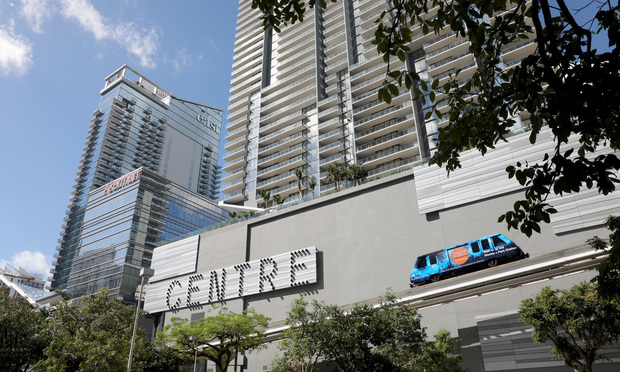South Florida Office Market Evolves With Smaller Offices, Urban Push, Preference for Quality
The evolution of the South Florida office market is multifaceted. As some companies seeking smaller offices for the same number of employees, others are growing their space. And as some companies seek top-quality offices to keep their staff happy, others are letting more staffers work from home.
February 26, 2018 at 08:00 AM
9 minute read

The South Florida office market's health and strength aren't in question, save for an expected leveling off, experts said.
Beyond that, other aspects of the market are in question. How would offices look as demand changes? In what part of the region would offices be concentrated? And what is even considered a top-quality office nowadays?
From companies shrinking to much smaller offices to a shift to the urban core and high-quality buildings, the office market is rapidly evolving as tenants' tastes change and trendsetting projects are built.
Take, for example, this change: It used to be conventional wisdom that Class A space in Miami was an office with unobstructed water views, said Alan Kleber, managing director at real estate services firm JLL in Miami.
But that's no longer the case. Class A now has more to do with the amenities available to employees, such as public transit and walking proximity to entertainment.
Brickell City Centre is the prime — and first — office that illustrates this change, Kleber said.
The Metromover stops at the mixed-use Brickell City Centre, which is home to two office buildings. Three Brickell City Centre at 98 SE Seventh St. is a Class A office building, and its tenants include law firm Akerman's headquarters. Two Brickell City Centre at 78 SW Seventh St. has tenants that include global coworking space company WeWork.
“We have arrived at becoming a real city, a real 24-hour live-work-play city,” Kleber said. “With Brickell City Centre, what dawned on us when we were touring it is, 'Here is a Class A office project that's not set on the water, that has no water views, and it's achieving Class A rates in comparison to other buildings that have Class A views.' That is a first in our market. I think that shows the evolution and maturity” of the market and the local economy.
OVERALL MARKET
Trends aside, a look at the overall South Florida office market shows it's healthy and growing — although a leveling off is expected as part of the market cycle, a real estate expert said.

“The fundamentals are quite good for office product. I don't think anyone is expecting any sort of crash,” said Jonathan Kingsley, executive vice president for real estate services firm Colliers International South Florida in Fort Lauderdale. But “there's going to be some sort of slowdown. Our forecast is end of '18 and then 2019 you maybe see some pushback, just because there's been so much growth, so at some point there's got to be settling down.”
No great market shift is foreseen.
“We think it's a stabilization and at worst-case scenario, maybe a 5 to 10 percent adjustment in what we are seeing in the rates and values,” he said. “But nothing that would put most owners into a foreclosure or a recapitalization mode.”
About 740,000 square feet of office space is under construction in Miami-Dade County and none in Broward or Palm Beach counties, according to JLL's fourth-quarter 2017 reports. At the same time, 4.2 million square feet is proposed in Broward as either standalone office or part of mixed-use projects, but only a fraction is expected to be delivered.
Kingsley and other real estate experts aren't forecasting an unfavorable tip in the supply-and-demand balance.
Robust population and job growth will fuel the demand needed to fill new offices, Kingsley said.
Broward is home to growing industries, said Deanna Lobinsky, executive director for Cushman & Wakefield's agency leasing team in Fort Lauderdale.
With “health care and technology specifically, Broward County has those types of industries in place” and should expand. “I expect we will continue to see continued increased activity,” she said.
If 2017 was any indication of how the market will do this year, the numbers bode well.
In Palm Beach, the vacancy rate has been decreasing since 2013, hitting 14.6 percent in the fourth quarter 2017, and available space is leasing up faster likely because no major new office projects are in the pipeline, according to a JLL report.
In Broward, the vacancy rate also has been decreasing since 2013, dipping to 12.7 percent in the fourth quarter.
In Miami-Dade, the vacancy rate was 13.5 percent in the fourth quarter, on par with the previous year's 13.6 percent, according to the report.
Miami-Dade had the highest gross average asking rent of the three counties at $36.71 per square foot, according to the JLL report. Rent for Class A office space in Miami's Brickell district reached an all-time high of $52.70 per square foot.
CITY CENTERS
The top-dollar rent paid for Brickell offices could indicate the flight to quality and away from Class B and older Class A spaces, a trend that's expected to continue in 2018.
It's about keeping employees happy and, in turn, productive, Kleber said.
“The only reason office space exists in the first place is to drive the business of the business. The business is to produce revenue … . Do you accomplish that by having happier and more engaged employees? The answer is yes,” Kleber said. “That means organizations are looking beyond the obvious and are trying to identify projects that provide a higher, a more enhanced employee benefit package.”
That means access to transportation and amenities within walking distance, often provided in mixed-use projects like the under-construction Miami Worldcenter.
Once finished, Miami Worldcenter will be next to the downtown Miami Brightline passenger train station and have 600,000 square feet of office space.
But the flight to quality has a downside, albeit not a catastrophic one.
It “will put some downward pressure on lesser quality Class A and Class B spaces,” Kleber said.
But, he added, there will be a tipping point.
“If pricing gets extreme, organizations are going to have to pull back on” moving to Class A offices, Kleber said.
And just as companies are seeking the newest and best buildings, they also want their buildings to be in the right place, which means downtown and the urban core in general.
This trend has been particularly notable in Fort Lauderdale's central business district, where offices have been filling with out-of-town tenants as well as those relocating from suburban offices.
“I think we tracked some 600,000 square feet of tenants that relocated to downtown over the past three years,” said Lobinsky of Cushman & Wakefield.
Illustrating this trend was law firm Becker & Poliakoff's move in 2014 from Hollywood to a 46,000-square-foot space at 1 E. Broward Blvd. Global electronics supplier KEMET Corp. is moving its headquarters from South Carolina to a 51,000-square-foot office in the same building in the first quarter 2018.
SMALLER OFFICES
The South Florida office evolution is multifaceted — as some companies are looking for the best offices to keep their staff happy while others favor remote operations.
“Typically, you will have a total headcount of say 50 people. Out of those, typically in the past … 75 percent used to be on the floor working and about 25 percent would actually travel,” said Eva Garza, vice president for JLL in Miami. “Now we are actually seeing that thanks to technology and different policies … the companies are reducing the square-foot allocation and allowing employees to work from home. One workstation is not assigned to one employee anymore.”
In general, space needs per employee have dropped 12 percent to 32 percent, depending on the industry, office size and location, Garza said.
Miami law firms have been trimming space per employee by about 12 percent from the 250 to 340 square feet per employee they used to allot, according to Garza.
Some tech companies are cutting space dramatically to 140 or even 125 square feet per employee , down from the typical 170 to 200 square feet per employee, according to Garza.
Companies are seeking less space even when they increase the number of employees, added Kingsley of Colliers International.
“That is definitely a trend we have seen all around the country and particularly in South Florida because rents have increased significantly and tenants are looking for other ways to reduce occupancy costs where they can,” he said.
This space reduction by some companies is good news for others that are growing. This is especially true for companies expanding in markets with limited new construction, such as Broward.
In Dania Beach, pet food and products online retailer Chewy Inc. in October expanded its headquarters at the Design Center of the Americas off Interstate 95 to 100,000 square feet.
“As other tenants have been maybe downsizing, you then have this organic growth of other companies that take up a large block of space,” Kingsley said. “That's been a good balance.”
This content has been archived. It is available through our partners, LexisNexis® and Bloomberg Law.
To view this content, please continue to their sites.
Not a Lexis Subscriber?
Subscribe Now
Not a Bloomberg Law Subscriber?
Subscribe Now
NOT FOR REPRINT
© 2025 ALM Global, LLC, All Rights Reserved. Request academic re-use from www.copyright.com. All other uses, submit a request to [email protected]. For more information visit Asset & Logo Licensing.
You Might Like
View All
Yacht Broker Says It 'Has Done Nothing Wrong.' Asks Miami Court to Dismiss the Case

Hyper-Reality Revisited: A Tour of Waldorf Astoria Hotel & Residences Miami
5 minute read
10 Years Later, This High Court Fight Over Real Estate Commissions Is Far From Over
4 minute read
Broward Judge Awards $9.9M in Attorney Fees and Costs After $33M Salmon Settlement
4 minute readTrending Stories
Who Got The Work
J. Brugh Lower of Gibbons has entered an appearance for industrial equipment supplier Devco Corporation in a pending trademark infringement lawsuit. The suit, accusing the defendant of selling knock-off Graco products, was filed Dec. 18 in New Jersey District Court by Rivkin Radler on behalf of Graco Inc. and Graco Minnesota. The case, assigned to U.S. District Judge Zahid N. Quraishi, is 3:24-cv-11294, Graco Inc. et al v. Devco Corporation.
Who Got The Work
Rebecca Maller-Stein and Kent A. Yalowitz of Arnold & Porter Kaye Scholer have entered their appearances for Hanaco Venture Capital and its executives, Lior Prosor and David Frankel, in a pending securities lawsuit. The action, filed on Dec. 24 in New York Southern District Court by Zell, Aron & Co. on behalf of Goldeneye Advisors, accuses the defendants of negligently and fraudulently managing the plaintiff's $1 million investment. The case, assigned to U.S. District Judge Vernon S. Broderick, is 1:24-cv-09918, Goldeneye Advisors, LLC v. Hanaco Venture Capital, Ltd. et al.
Who Got The Work
Attorneys from A&O Shearman has stepped in as defense counsel for Toronto-Dominion Bank and other defendants in a pending securities class action. The suit, filed Dec. 11 in New York Southern District Court by Bleichmar Fonti & Auld, accuses the defendants of concealing the bank's 'pervasive' deficiencies in regards to its compliance with the Bank Secrecy Act and the quality of its anti-money laundering controls. The case, assigned to U.S. District Judge Arun Subramanian, is 1:24-cv-09445, Gonzalez v. The Toronto-Dominion Bank et al.
Who Got The Work
Crown Castle International, a Pennsylvania company providing shared communications infrastructure, has turned to Luke D. Wolf of Gordon Rees Scully Mansukhani to fend off a pending breach-of-contract lawsuit. The court action, filed Nov. 25 in Michigan Eastern District Court by Hooper Hathaway PC on behalf of The Town Residences LLC, accuses Crown Castle of failing to transfer approximately $30,000 in utility payments from T-Mobile in breach of a roof-top lease and assignment agreement. The case, assigned to U.S. District Judge Susan K. Declercq, is 2:24-cv-13131, The Town Residences LLC v. T-Mobile US, Inc. et al.
Who Got The Work
Wilfred P. Coronato and Daniel M. Schwartz of McCarter & English have stepped in as defense counsel to Electrolux Home Products Inc. in a pending product liability lawsuit. The court action, filed Nov. 26 in New York Eastern District Court by Poulos Lopiccolo PC and Nagel Rice LLP on behalf of David Stern, alleges that the defendant's refrigerators’ drawers and shelving repeatedly break and fall apart within months after purchase. The case, assigned to U.S. District Judge Joan M. Azrack, is 2:24-cv-08204, Stern v. Electrolux Home Products, Inc.
Featured Firms
Law Offices of Gary Martin Hays & Associates, P.C.
(470) 294-1674
Law Offices of Mark E. Salomone
(857) 444-6468
Smith & Hassler
(713) 739-1250






